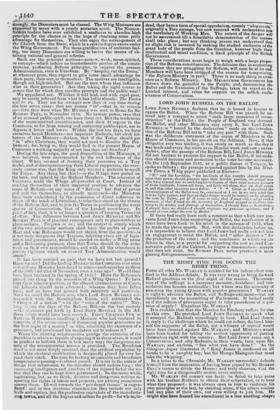LORD JOHN RUSSELL ON THE BALLOT.
LORD JOHN RUSSELL declares that he is bound in honour to oppose the Ballot. When the Reform Bill was passed, he en- tered into a compact to resist "such large measures of recon- struction " as the Ballot : the People of England may demand the Ballot, and other Ministers may carry it, but Lord JOHN RUSSELL is " bound by the declaration" made on the introduc- tion of the Reform Bill not to " take any part" with them. Such was the deliberate statement of the organ of Ministers in the House of Commons, in his speech on the Address. Now, if this obligation ever was binding, it was surely as much so the day it was made and every day since as on Monday week and now : never- theless, after the passage of the Reform Bill, Lord JOHN RUSSELL did not hesitate to promise his support to the Ballot, if intimida- tion should increase and protection to the voter become necessary. On the 15th September 1832, at a public dinner at Torquay', he spoke as follows : the passage is quoted against him by the fliest- ern Times, a Whig paper published at Exeter- " If " said his Lordship, " the landlords of this country should presume upon their power, should presume upon their terrible position, to compel men who have entered into no such bargain to dispose of their votes as mere servants of these landlords, I must tell them, and fairly tell them, that we shall resent it, and that other measures must follow. 0 • • Great as I apin them! the inconveniences of the Ballot may be, convinced as I am in my own mind that it is no light matter, and that no slight danger would be entered on by adopting the vote by Ballot, yet if it come to this, that I must either adopt such a measure, or that I must see the tenantry of England ranged at elections con. trary to the wishes and feelings of themselves, should have no la sitation- I should have no doubt—I shot, d renounce my previous opinions, and I should at once adopt the rote by Ballot."
If there had really been such a compact as that which now pre- vents Lord JOHN from supporting the Ballot, the recollection of it must have been fresh in his mind in the autumn of 1832, when he made the above speech. But, with this declaration before us, it is impossible to believe that I.ord Jonar had really entered into an engagement to resist the Ballot, and " other measurl" for the protection of the voter ; and the conclusion to which we are driven is, that, as a pretext for supporting the now avowed Con- serVative policy of the Cabinet, he feigns a conscientious scruple that does not exist. Sir ROBERT PEEL never practised a more glaring disingenuousness.


























 Previous page
Previous page